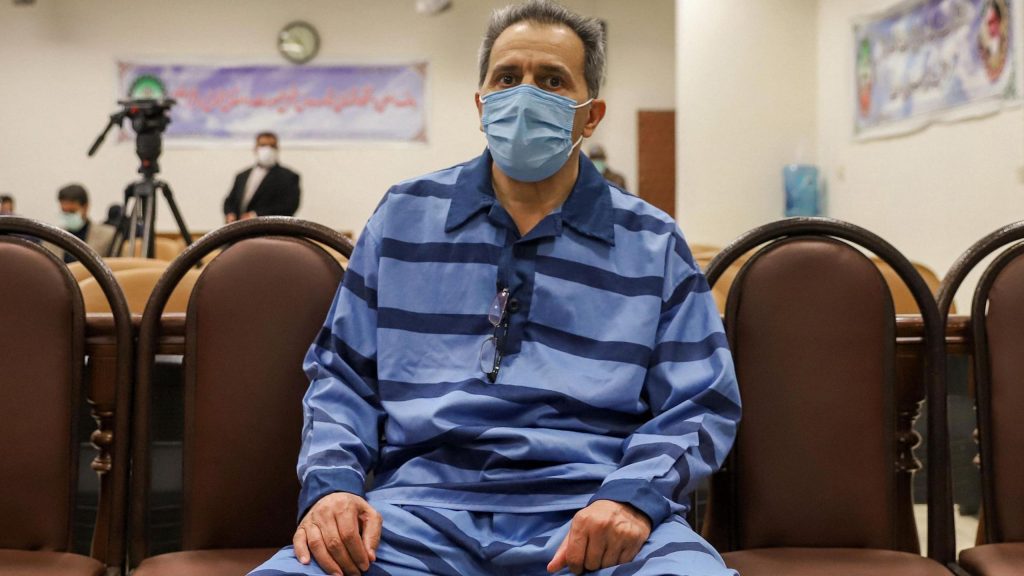Iran Executes German-Iranian Dissident Amid International Outcry
3 min read
Sharmahd had told relatives he had been denied adequate healthcare while in custody

Sharmahd had told relatives he had been denied adequate healthcare while in custody
Iran has executed Jamshid Sharmahd, a German-Iranian dissident, after he was convicted of “leading terror operations.” Reports from state media indicate that Sharmahd’s execution took place following a death sentence he received last year for “corruption on Earth,” amid allegations that he led a pro-monarchist group based in the United States.
Sharmahd consistently denied the charges against him, and his family maintained that he was merely a spokesperson for the group. The German government reacted strongly to the execution, with Foreign Minister Annalena Baerbock emphasizing that Berlin had repeatedly warned Tehran about the potential consequences of executing a German citizen. In a post on social media platform X, she described the act as reflective of the “inhumane regime” in Iran.
The German ambassador in Tehran met with the Iranian foreign minister to formally protest Sharmahd’s execution, which the German Foreign Office described as a grave violation of international norms. Additionally, the Iranian chargé d’affaires was summoned for discussions on the matter, highlighting the diplomatic tensions arising from the incident.
Human rights organizations have also condemned Sharmahd’s execution. Mahmood Amiry-Moghaddam, director of the Norway-based Iran Human Rights group, stated that the entire process surrounding Sharmahd’s arrest, trial, and execution constituted a serious breach of international law. Sharmahd was reportedly kidnapped by Iranian agents in Dubai in 2020 and taken forcibly to Iran via Oman. In August of that year, Iran’s intelligence ministry announced his arrest but did not provide details on how it was carried out.
Amnesty International has claimed that Sharmahd was coerced into confessing and had informed his family that he suffered torture during his detention. Sharmahd had previously established a website to disseminate statements from the Kingdom Assembly of Iran, a little-known U.S.-based group that advocates for the restoration of the monarchy that was overthrown in the 1979 Islamic Revolution.
Iranian authorities claimed that Sharmahd was the leader of Tondar (Persian for Thunder) and had orchestrated 23 terrorist attacks, five of which were said to be successful, including a bombing in Shiraz in 2008 that killed 14 people. A video was released by Iranian officials showing him blindfolded and confessing to various charges.
Sharmahd was sentenced to death in February of the previous year. His daughter, Gazelle Sharmahd, publicly called for an investigation by German authorities into the Iranian judiciary’s treatment of her father. She expressed deep concern for his wellbeing, alleging that he was subjected to inhumane conditions in solitary confinement. In a July 2023 interview with the BBC, she stated, “They’re killing him softly in solitary confinement in this death cell,” adding that Iranian authorities appeared intent on staging a public execution to instill fear among dissidents.
On Sunday, the Iranian judiciary confirmed that Sharmahd had been executed, following approval from the Supreme Court. German Chancellor Olaf Scholz labeled the execution a “scandal,” emphasizing that Sharmahd was denied a fair opportunity to defend himself during the trial.
The execution has drawn widespread condemnation from human rights advocates and foreign governments, emphasizing the ongoing issues of due process and human rights violations in Iran. The international community is increasingly alarmed by the Iranian government’s heavy-handed tactics against dissent, raising questions about the country’s commitment to fundamental human rights principles.
Sharmahd’s execution is seen not only as a punitive measure against a specific individual but also as part of a broader strategy by the Iranian regime to silence opposition voices and discourage activism against the government. As tensions escalate, the implications of this event will likely reverberate beyond Iran’s borders, influencing diplomatic relations and humanitarian efforts concerning human rights.
The fate of dissidents like Jamshid Sharmahd underscores the precarious nature of political freedom in Iran, as the government continues to crack down on dissent and impose harsh penalties for those who challenge its authority.